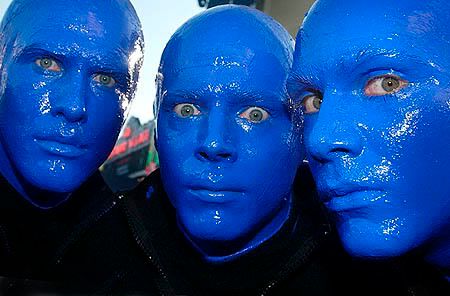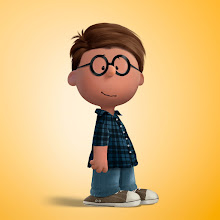I read the individual issues as they first came out in 1986, and I knew from the beginning that I was experiencing something way beyond the cookie-cutter superhero comics I'd been buying up until that point. Important and complex things were happening. By the twelfth issue, I didn't exactly consider the series bona fide literature--but that was only because I hadn't realized that comics could be literature.
I reread the hardcover collection in the weeks leading up to the movie's premiere, and there's no doubt in my mind that Alan Moore and Dave Gibbons created a literary masterpiece. (I also listened to the entire series of Comic Geek Speak "Footnotes" podcasts recapping each issue, because I knew I'd missed themes and symbolism in the past. Those boys clued me in to stuff I hadn't even considered. Kudos to them.)
 I wish I could tell you that if I weren't the comic book fan I am, that I would've loved the movie anyway. I wish I could, but it's impossible to be sure. At the bare minimum it succeeds in depicting an alternate world on the brink of nuclear Armageddon, populated by a handful of impotent heroes forced into retirement and/or employed as weapons by the military. The plot poses the mystery of who would eliminate these castrated heroes and why, then asks us to judge a Big Bad who uses a proverbial sword on a Gordian Knot in order to change everything. Going by a "this tale hasn't been told on film yet" level alone, it delivered the goods.
I wish I could tell you that if I weren't the comic book fan I am, that I would've loved the movie anyway. I wish I could, but it's impossible to be sure. At the bare minimum it succeeds in depicting an alternate world on the brink of nuclear Armageddon, populated by a handful of impotent heroes forced into retirement and/or employed as weapons by the military. The plot poses the mystery of who would eliminate these castrated heroes and why, then asks us to judge a Big Bad who uses a proverbial sword on a Gordian Knot in order to change everything. Going by a "this tale hasn't been told on film yet" level alone, it delivered the goods.Zack Snyder compressed a lot of storytelling into his film, but it didn't feel like overkill. I summarily dismiss other critics' claims that he was a slave to the adaptation. It's nonsense. As much respect as I have for Gibbons' art, I wouldn't necessarily call his work dynamic. Snyder's visuals on this movie were dynamic; almost breathtaking at times. He lifted many panels from the comic, but you're an idiot if you didn't expect him to. He owned the look of this reality (only David Fincher could have done it better).
Snyder took liberties with a few plot elements, and many fans have, in turn, taken issue with those fixes. (The poor guy simply can't win...should he change shit or shouldn't he?) I can confirm that the ratio of what he left to what he noticeably changed is about 10 to 1. But the things he did tweak were necessary to the believability of the story. There are a lot more folks who'll see this movie that didn't read the comic than those who did, and they're not gonna notice a change in tone or sense something was deleted. And those of us who realize movies and sequential art are two intrinsically different art forms--and that some things simply don't translate well--just won't care. (Follow this minor spoiler footnote for the three "big" differences I noticed...and why they still don't change the tone of the film.*)
Watchmen was almost three hours long. Snyder took his time and paced it out. He let it breathe and didn't rush it. He loosely stuck to Moore's already loose two-issue-per-character exploration, but I could've gotten to know the characters even more--especially Rorschach and Silk Spectre II (the former being my favorite, and because the latter didn't have a real origin). None of the heroes were slighted, mind you, but I honestly wanted a longer movie.
I hear there's a director's cut in the works. That's a must-own. I'll strip naked and cover myself in blue paint while watching it.
What? That's what I did while reading it.
Note: I'll award a Rider's Block no-prize to the first commenter who tells me where Zack Snyder worked a 300 reference into Watchmen.
* Rorschach takes a more hands-on approach to dispatching a child killer than he did in the comic. So the hell what? It made his origin story all the more shocking.
In the comic, Dr. Manhattan is the only hero with actual powers, but in the movie the others are throwing thugs across rooms and breaking walls with their fists. This was probably done to appease mainstream audiences who need to see snapping bones in their R-rated action movies, along with comic fans who didn't "get" the subtle tone of the original story. I was cool with it, and I especially liked that the bad guy took a few licks...he needed to.
There's no space squid in the movie, and I don't care. I always thought that was the most outlandish element in Moore's plot. Snyder's change actually makes sense, and improves the story without altering the tone. The doomsday clock is stopped and gives a terrified world a chance to reflect and give peace a chance. Whether it's accomplished due to a psychic blast or [the movie's alternative], the outcome was never certain and ultimately open to interpretation.


4 comments:
I was actually happy when I heard that the squid was not making it to the film. I thought that was outlandish, as well, and unnecessary. Plus, it always bothered me as being completely extraneous that the squid was supposed to be a vagina and an ass.
The one thing that always upset me about the story was that Veidt didn't get a hand laid on him in the end. I always felt that, for what he did, he should have gotten something. I realize that that's what the whole last panel of the book was for, but still, it's nice to see some actual fist-meets-jawline reparations.
Dr. Mal's briefcase combination.
MJenks: It's on its way. Who watches the briefcase? You and I, apparently.
One of my best friends in college was a communications major with an eye toward film production. Watching movies with him, I learned to pick up on little things, to watch the action while seeing the whole screen, and just sort of noticing everything at once. That's how I saw the 300 reference.
Post a Comment